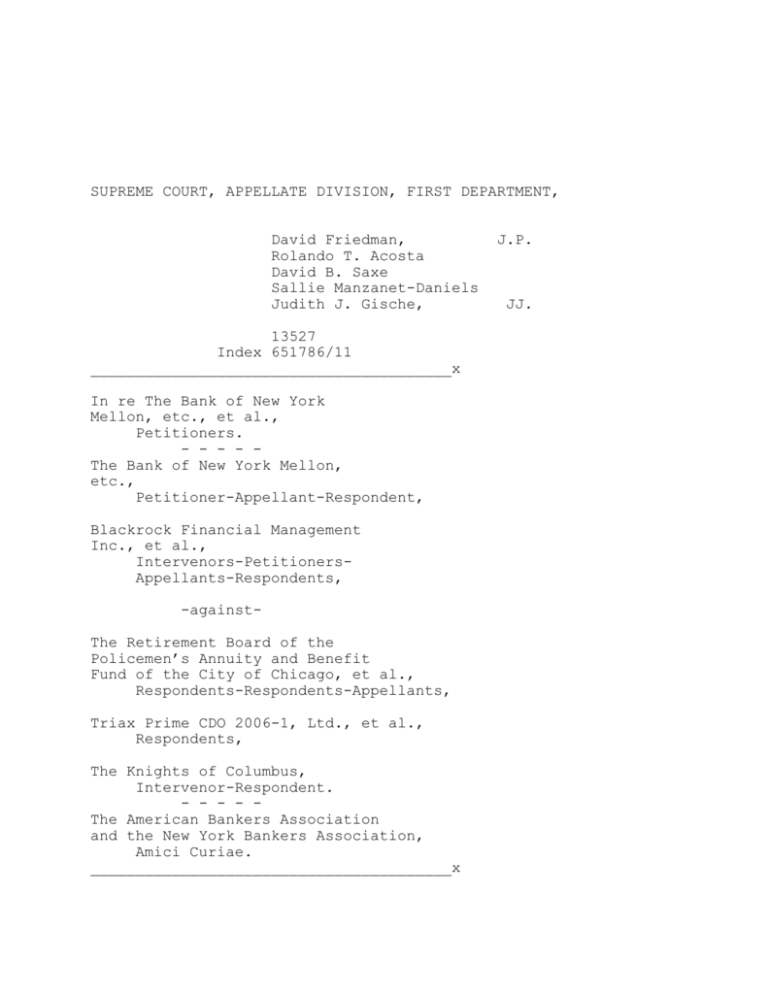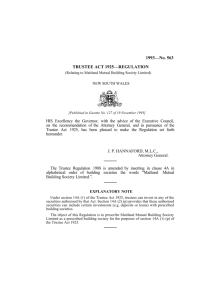View the court's order here
advertisement

SUPREME COURT, APPELLATE DIVISION, FIRST DEPARTMENT, David Friedman, Rolando T. Acosta David B. Saxe Sallie Manzanet-Daniels Judith J. Gische, 13527 Index 651786/11 ________________________________________x In re The Bank of New York Mellon, etc., et al., Petitioners. - - - - The Bank of New York Mellon, etc., Petitioner-Appellant-Respondent, Blackrock Financial Management Inc., et al., Intervenors-PetitionersAppellants-Respondents, -againstThe Retirement Board of the Policemen’s Annuity and Benefit Fund of the City of Chicago, et al., Respondents-Respondents-Appellants, Triax Prime CDO 2006-1, Ltd., et al., Respondents, The Knights of Columbus, Intervenor-Respondent. - - - - The American Bankers Association and the New York Bankers Association, Amici Curiae. ________________________________________x J.P. JJ. Cross appeals from the order and judgment (one paper), of the Supreme Court, New York County (Barbara R. Kapnick, J.), entered February 21, 2014, in this special proceeding brought pursuant to CPLR article 77, approving the settlement agreement except to the extent it releases the loan modification repurchase claims. Mayer Brown LLP, New York (Matthew D. Ingber, Christopher J. Houpt, Hannah Y.S. Chanoine, Michael Kimberly and Michael Rafield of counsel), and Dechert LLP, New York (James M. McGuire, Hector Gonzalez and Mauricio A. España, of counsel), for The Bank of New York Mellon, appellant-respondent. Gibbs & Bruns LLP, Houston, TX (Kathy D. Patrick of the bar of the State of Texas, admitted pro hac vice, of counsel), and Warner Partners, P.C., New York (Kenneth E. Warner of counsel), for intervenorsappellants-respondents. Scott+Scott, LLP, New York (Beth A. Kaswan, William C. Fredericks and Max R. Schwartz of counsel), for The Retirement Board of the Policemen’s Annuity & Benefit Fund of the City of Chicago, City of Grand Rapids General Retirement System, City of Grand Rapids Police and Fire Retirement System and The Westmoreland County Employee Retirement System, respondents-appellants. Halperin Battaglia Raicht, LLP, New York (Donna H. Lieberman and Scott A. Ziluck of counsel), for United States Debt Recovery VIII, LP and United States Debt Recovery X, LP, respondents-appellants. Federman & Sherwood, New York (William B. Federman of counsel), for American Fidelity Assurance Company, respondent-appellant. 2 Alston & Bird LLP, New York (Michael E. Johnson and Alexander S. Lorenzo of counsel), for amici curiae. 3 SAXE, J. This appeal requires us to consider the nature and extent of the scrutiny the court may properly apply to a trustee’s settlement of claims of misconduct on the part of the originator and servicer of residential mortgage backed securities. Petitioner Bank of New York Mellon (BNYM), as trustee, commenced this proceeding pursuant to CPLR Article 77, seeking court approval for a settlement of claims brought on behalf of a large group of certificateholders against the originator and servicer of the residential mortgage backed securitization trusts for which BNYM serves as trustee. Some other certificateholders opposed the settlement, asserting a number of failures with regard to the Trustee’s handling of the negotiation and with regard to the proposed settlement. We conclude that the Trustee properly exercised its discretion in its settlement of all the claims. Background Between 2004 and 2008, approximately 1.6 million residential mortgage loans were bundled together into securities pursuant to Pooling and Servicing Agreements (PSAs) or Sale and Servicing Agreements (collectively, Governing Agreements), and held in 530 residential mortgage-securitization trusts, with BNYM serving as Trustee. These mortgage-backed securities were originated and 4 sold by Countrywide Home Loans, then underwritten and sold to investor-certificateholders. Countrywide serviced the loans until it was acquired by Bank of America (BofA) in July 2008. On October 18, 2010, following the collapse in the housing market and the decline in the value of mortgage-backed securities, a Notice of Non-Performance was issued to Countrywide and Bank of New York by a large group of the certificateholders, referred to here as the Institutional Investors,1 who collectively hold more than $34 billion in certificates in the Trusts, representing 24% of the face value of all such certificates. 1 The Institutional Investors, intervenors-petitioners here, consist of: BlackRock Financial Management Inc.; Kore Advisors, L.P.; Maiden Lane, LLC; Metropolitan Life Insurance Company; Trust Company of the West and affiliated companies controlled by The TCW Group, Inc.; Neuberger Berman Europe Limited; Pacific Investment Management Company LLC; Goldman Sachs Asset Management, L.P.; Teachers Insurance and Annuity Association of America; Invesco Advisors, Inc.; Thrivent Financial for Lutherans; Landesbank Baden-Wuerttemberg; LBBW Asset Management (Ireland) plc, Dublin; ING Bank fsb; ING Capital LLC; ING Investment Management LLC; Nationwide Mutual Insurance Company and its affiliated companies; AEGON USA Investment Management LLC, authorized signatory for Transamerica Life Insurance Company, AEGON Financial Assurance Ireland Limited, Transamerica Life International (Bermuda) Ltd., Monumental Life Insurance Company, Transamerica Advisors Life Insurance Company, AEGON Global Institutional Markets, plc, LIICA Re II, Inc., Pine Falls Re, Inc., Transamerica Financial Life Insurance Company, Stonebridge Life Insurance Company, and Western Reserve Life Assurance Co. of Ohio; Federal Home Loan Bank of Atlanta; Bayerische Landesbank, Prudential Investment Management, Inc.; and Western Asset Management Company. 5 The Settlement Beginning in November 2010, the Institutional Investors, with the participation of the Trustee and its retained counsel, engaged in negotiations with Countrywide and BofA to reach a settlement of the claims raised in their Notice of NonPerformance for the benefit of the Trusts. Ultimately, with the assistance and participation of the Trustee, the Institutional Investors arrived at a proposed settlement agreement with BofA and Countrywide, dated June 28, 2011. Under the settlement, BofA and Countrywide agreed to: (1) pay $8.5 billion into the Trusts, allocated pursuant to an agreed-upon methodology that accounts for past and expected future losses associated with the loans in each Trust; (2) implement improvements in mortgage servicing procedures, including transfer of high-risk loans to specialty subservicers, which improvements could not have been achieved in litigation, and were valued at $3 billion; and (3) indemnify the Trusts against certain losses caused by an alleged failure by the seller to deliver mortgage loan files in the proper form. The Trustee then commenced this special proceeding under CPLR Article 77, for court approval of the settlement agreement, and the Institutional Investors made a motion to intervene as copetitioners. Following a worldwide notice program, the 6 Objectors,2 a group of certificateholders who opposed the settlement, were permitted to intervene. A lengthy hearing was then held. In opposition to the settlement, the Objectors argued that the Trustee had acted unreasonably, in bad faith, and outside its discretion by (1) failing to represent Certificateholders’ interests during settlement negotiations and placing its own interests above those of Certificateholders, focusing on its own liability exposure; (2) retaining conflicted counsel who immediately focused on a settlement without properly investigating the loans or evaluating the strengths and weaknesses of the various claims; (3) relying on faulty assumptions to estimate a low settlement range for the claims; and (4) failing to insist on a loan file review. Additionally, some of the Objectors specifically argued that the seller or servicer of the Trusts’ loans had breached their obligation under the PSAs to repurchase modified loans from the Trusts, and that 2 The Objectors consist of the Retirement Board of the Policemen's Annuity & Benefit Fund of the City of Chicago, the City of Grand Rapids General Retirement System, and the City of Grand Rapids Police and Fire Retirement System [the "Public Pension Funds"], United States Debt Recovery VIII, LP and United States Debt Recovery X, LP [the "US Debt Recovery Entities"], and American Fidelity Assurance Company ["American Fidelity"]. The AIG Entities and the Triaxx Entities that appear as respondents in the caption have withdrawn their appeals. 7 the settlement improperly releases those claims without the necessary scrutiny or assessment of their value. While Supreme Court approved the bulk of the settlement, and rejected the claims faulting the Trustee’s conduct, it agreed with those Objectors who took issue with the settlement’s release of claims arising out of the alleged failure to repurchase modified loans. The court held that the Trustee had acted “unreasonably or beyond the bounds of reasonable judgment” by failing to investigate the potential worth or strength of those claims before releasing them. Specifically, the court asserted that the Trustee’s attorney, Jason Kravitt, had not shown that a factual assessment had been made of the value of those claims. It disapproved of Kravitt’s reliance on the reasoning that (1) BofA had a strong argument that the language in the PSAs did not require the repurchase of loans modified for loss mitigation purposes; (2) since loss mitigation modifications were favored by both state and federal governments, it did not think BofA would agree to repurchase the loans that were modified on that basis; and (3) the claim for compensation based on the failure to repurchase the modified loans was a weak one for negotiation purposes, and it was a better negotiation strategy to focus on the strong contentions. In rejecting the Trustee’s foregoing reasoning, the court explained that the submissions lacked 8 evidentiary material supporting the Trustee’s interpretation of the language in the PSAs regarding the repurchase obligation for modified loans, particularly noting that the Trustee had not retained an expert for this issue. Discussion The ultimate issue for determination here is whether the trustee’s discretionary power was exercised reasonably and in good faith (see Haynes v Haynes, 72 AD3d 535, 536 [1st Dept 2010]). It is not the task of the court to decide whether we agree with the Trustee’s judgment; rather, our task is limited to ensuring that the trustee has not acted in bad faith such that his conduct constituted an abuse of discretion (id.). We agree with Supreme Court that the Trustee did not abuse its discretion or act unreasonably or in bad faith in embarking on the settlement here. The Trustee acted within its authority throughout the process, and there is no indication that it was acting in self-interest or in the interests of BofA rather than those of the certificateholders. Importantly, “if a trustee has selected trust counsel prudently and in good faith, and has relied on plausible advice on a matter within counsel’s expertise, the trustee’s conduct is significantly probative of prudence” (Restatement [Third] of Trusts § 77, Comment b[2]). While reliance on the advice of 9 counsel may not always be the end of the analysis regarding a claimed breach of trust -- it is possible for a trustee to specifically seek out legal advice that would support the trustee's desired course of conduct, or there may be other circumstances establishing that it was unreasonable to follow the legal advice (id.) -- a party challenging the decisions of a trustee who followed the advice of a highly-regarded specialist in the relevant area of law can prevail only upon a showing that, based on the particular circumstances, the reliance on such counsel’s assessment was unreasonable and in bad faith. Court approval of the settlement does not require that the court agree with counsel’s judgment or assessment; all that is required is a determination that it was reasonable for the Trustee to rely on counsel’s expert judgment. Supreme Court correctly rejected the arguments that the Trustee’s retained law firm, Mayer Brown, suffered from a disabling conflict of interest such that the firm could not render valid legal analysis and advice. The nature of the asserted conflict was disclosed and waived, and had no impact on the propriety of the advice on which the Trustee relied. Indeed, reliance on the advice of lead counsel, Jason Kravitt, was eminently reasonable. Kravitt was a leading expert in the field of securitization, and he and his team of 10 experienced securitization lawyers thoroughly reviewed the relevant governing agreements. Ultimately, they reasonably embraced a negotiating strategy that did not specifically seek recovery for the claimed failure to repurchase modified loans for any of the 530 Trusts. Viable legal reasoning led to the conclusion that the PSAs did not appear to require repurchase by the seller of loans that the seller or servicer modified for loss mitigation purposes -- the only type of modification actually performed on the mortgage loans in the Trust. Moreover, it was reasonable to suggest that BofA was unlikely to agree to repurchase such loans because that type of modification was being encouraged by government policy in the foreclosure crisis. Nor was it unreasonable for Kravitt to recommend against pressing what he perceived to be a weak argument regarding the claimed repurchase obligation for loan modifications, since doing so could detract from efforts to press the stronger claims for breach of warranty and servicing obligations. Indeed, the release of weak claims in the context of comprehensive settlements may be a viable and reasonable negotiation strategy (see e.g. In re Triac Cos., Inc., 791 A2d 872, 876, 878 [Del Ch 2001]; Manacher v Reynolds, 165 A2d 741, 747 [Del Ch 1960]); here, there was reason to suggest that declining to press the weak claims would not reduce the total amount of money the 11 Trustee would ultimately achieve in pressing the stronger claims. In evaluating the elements of the settlement, the Trustee properly obtained and considered the opinions of several highly respected outside experts, including not only the assessment of the money value of the claims, but assessments of Countrywide’s ability to pay -- estimated by experts as a maximum of $4.5 billion -- and the likelihood of success of BofA’s defense against a claim of successor liability, a claim which experts warned had never been successfully applied in such a situation. Kravitt’s decision not to have an outside expert evaluate the legal merits of the loan modification claims does not undermine his assessment. Retained legal counsel can properly assess legal issues and nothing in the Trustee’s retention, or non-retention, of experts warrants the rejection of counsel’s assessment and advice or the Trustee’s ultimate decision to accept the terms of the negotiated settlement. It is also worth noting that it would have been unreasonable to decline to enter into the settlement with the expectation of obtaining a much greater judgment after years of litigation, while knowing that attempts to enforce such a judgment would likely result in the actual collection of a lesser sum than that offered in the proposed settlement. In rejecting the portion of the settlement that released the loan modification repurchase claims, and in finding that the 12 Trustee lacked the necessary basis for its assessment that the loan modification claims were too weak to warrant pursuing in negotiating the global settlement, Supreme Court disregarded the standard of deference due to a trustee’s exercise of discretionary judgment. Indeed, in doing so the court was, in effect, improperly imposing a stricter and far less deferential standard, one that allows a court to micromanage and second guess the reasoned, and reasonable, decisions of a Trustee. We therefore find that the Trustee did not abuse its discretion in deciding to release the claims based on the failure to repurchase the modified mortgages, and we approve the settlement in its entirety. Accordingly, the order and judgment (one paper), of the Supreme Court, New York County (Barbara R. Kapnick, J.), entered February 21, 2014, in this special proceeding brought pursuant to CPLR article 77, approving the settlement agreement except to the extent it releases the loan modification repurchase claims, should be modified, on the law and the facts, to approve the 13 settlement in all respects, including the aspect releasing the loan modification claims, and otherwise affirmed, without costs. All concur. THIS CONSTITUTES THE DECISION AND ORDER OF THE SUPREME COURT, APPELLATE DIVISION, FIRST DEPARTMENT. ENTERED: MARCH 5, 2015 _______________________ CLERK 14







